Question # 1
A technical architect is provided with the logic and Opportunity file shown below: The opportunity status logic is as follows:
For the opportunity stages “Interest”, “Confirmed Interest” and “Registered”, the status should be “Open”.
For the opportunity stage “Closed”, the opportunity status should be closed
Otherwise, return null for the opportunity status.
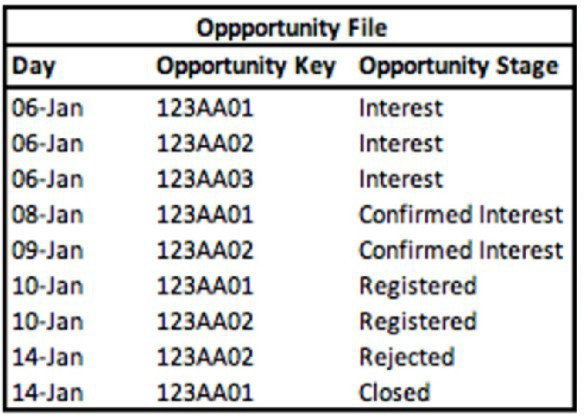
Given the above file and logic and assuming that the file is mapped in a GENERIC data stream type with the following mapping
“Day” — Standard “Day” field
“Opportunity Key” > Main Generic Entity Key “Opportunity Stage” — Main Generic Entity Attribute
“Opportunity Count” — Generic Custom Metric
A pivot table was created to present the count of opportunities in each stage. The pivot table is filtered on Jan 11th. What is the number of ‘opportunities in the Confirmed Interest stage? |
| A. 3 | | B. 1 | | C. 0 | | D. 2 |
C. 0
Explanation: Based on the data provided and the date filter set to January 11th, there are no records for 'Confirmed Interest' on that specific date in the Opportunity file. Thus, the number of opportunities in the 'Confirmed Interest' stage for January 11th would be zero(0).
In Salesforce Marketing Cloud Intelligence, when creating pivot tables, the data is aggregated based on the selected filters. If no records meet the filter criteria, the result for that category would be zero. The answer is supported by best practices in data analysis and reporting within Salesforce Marketing Cloud Intelligence, where date filters are applied to segment and analyze data.
Question # 2
An implementation engineer has been asked by a client for assistance with the following problem:
The below dataset was ingested:

However, when performing QA and querying a pivot table with Campaign Category and Clicks, the value for Type’ is 4.
What could be the reason for this discrepancy? |
| A. The measurement ‘Clicks’ is set as a percentage. | | B. A mapping formula was populated, indicating not to bring Type! values. | | C. The aggregation function is set as AVG | | D. The aggregation function is set as LIFETIME |
C. The aggregation function is set as AVG
Explanation: The discrepancy of 'Clicks' being reported as 4 for 'Type1' when the sum of clicks in the dataset for 'Type1' is 8 (2 on 02/02/2021 and 6 on 03/02/2021) suggests that the aggregation function used in the pivot table is set to average (AVG) rather than sum. Salesforce Marketing Cloud Intelligence allows setting different aggregation functions for metrics, and setting it to average would result in such a discrepancy when more than one entry for the same type exists. References: Salesforce Marketing Cloud Intelligence documentation on custom measurements and data aggregations explains how to set and understand different aggregation functions.
Question # 3
An implementation engineer has been provided with the below dataset:

*Note: CPC = Cost per Click Formula: Cost / Clicks
Which action should an engineer take to successfully integrate CPC? |
| A. Populate the logic within a custom measurement. No need to change Aggregation. | | B. Unmap it, as Datorama will calculate it automatically. | | C. Populate the logic within a custom measurement. Set Aggregation to AVG. | | D. Populate the logic within a custom measurement. Set Aggregation to SUM. |
A. Populate the logic within a custom measurement. No need to change Aggregation.
Explanation: CPC (Cost per Click) is a calculated metric that should be created using a custom measurement based on the formula provided (Cost / Clicks). This calculation does not require a change in the aggregation setting because it is derived from other base metrics that are already aggregated appropriately. In Salesforce Marketing Cloud Intelligence, custom measurements are used to create new metrics from existing data points, and the system will use the underlying data's aggregation to perform the calculation. References: Salesforce Marketing Cloud Intelligence documentation on creating custom measurements and calculated metrics.
Question # 4
A client's data consists of three data streams as follows:
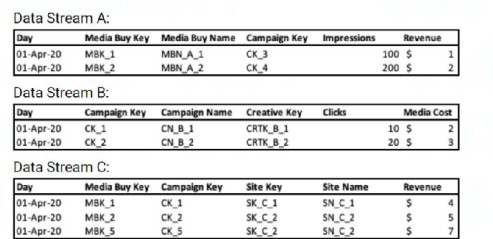
* The data streams should be linked together through a parent-child relationship.
* Out of the three data streams, Data Stream C is considered the source of truth for both the dimensions and measurements.
Which data stream should be set as a parent? |
| A. Data Stream A | | B. Data Stream C | | C. Any of the data streams can technically be the parent | | D. Data Stream B |
B. Data Stream C
Explanation: Since Data Stream C is considered the source of truth for both dimensions and measurements, it should be set as the parent data stream. This is because the parent data stream is used as the primary source for hierarchical and attribute data within a parent-child relationship setup. As the source of truth, Data Stream C will provide the foundational data upon which the other streams can be aligned and will ensure consistency and accuracy across the linked data.
Question # 5
A technical architect is provided with the logic and Opportunity file shown below: The opportunity status logic is as follows:
For the opportunity stages “Interest”, “Confirmed Interest” and “Registered”, the status should be “Open”.
For the opportunity stage “Closed”, the opportunity status should be closed
Otherwise, return null for the opportunity status
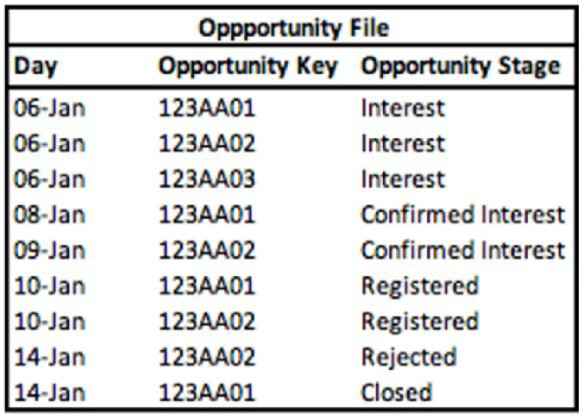
Given the above file and logic and assuming that the file is mapped in a GENERIC data stream type with the following mapping:
“Day” — Standard “Day” field
“Opportunity Key” > Main Generic Entity Key “Opportunity Stage” — Main Generic Entity Attribute “Opportunity Count” — Generic Custom Metric
A pivot table was created to present the count of opportunities in each stage. The pivot table is filtered on Jan 11th. What is the number of opportunities in the Interest stage? |
| A. 1 | | B. 3 | | C. 2 | | D. 0 |
D. 0
Explanation: Since the pivot table is filtered on January 11th and the provided Opportunity file does not show any records dated January 11th, there are zero opportunities in the Interest stage for that date. Salesforce Marketing Cloud Intelligence allows users to create pivot tables and filter data based on specific criteria, such as dates. In this case, the filter would exclude all rows that do not match the specified date, resulting in a count of zero for the Interest stage. This would apply to any stage since there are no records for January 11th. Reference can be made to Salesforce Marketing Cloud Intelligence documentation on filtering and pivot tables.
Question # 6
A technical architect is provided with the logic and Opportunity file shown below: The opportunity status logic is as follows:
For the opportunity stages “Interest”, “Confirmed Interest” and “Registered”, the status should be “Open”.
For the opportunity stage “Closed”, the opportunity status should be closed Otherwise, return null for the opportunity status.
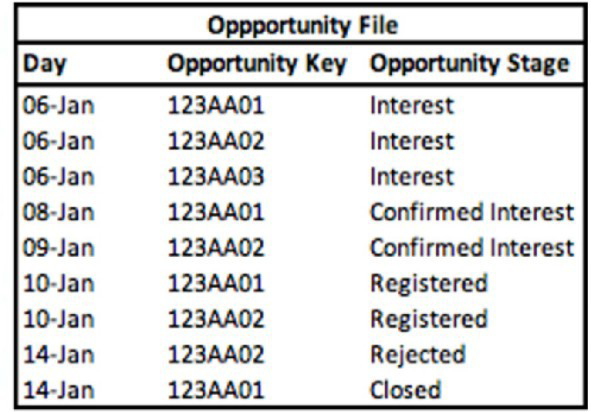
Given the above file and logic and assume that the file is mapped in the OPPORTUNITIES Data Stream type with the following mapping:
“Day” — “Created Date” “Opportunity Key” + Opportunity Key
“Opportunity Stage” — Opportunity Stage
A pivot table was created to present the count of opportunities in each stage. The pivot table is filtered on Jan 11th. What is the number of‘opportunitiesin the Confirmed Interest stage? |
| A. 2 | | B. 1 | | C. 3 | | D. 0 |
D. 0
Explanation: pivot table is filtered on January 11th, we refer to the Opportunity file and see that there are no records for January 11th. Thus, there would be zero opportunities in the Confirmed Interest stage on that date. The Salesforce Marketing Cloud Intelligence's pivot table feature allows for the display of counts of entities based on the filtered criteria, which in this scenario would show zero since no records exist for the filtered date. Reference: Salesforce Marketing Cloud Intelligence documentation on pivot table functionalities.
Question # 7
Your client has provided sample files of their data from the following data sources:
Google Campaign Manager

Below are the requirements from the client and additional information:
* The sources are linked to each other by shared Media Buy names.
* In addition to the mutual Media Buys, the sources contain campaign and site values. However, the client would like to see the campaign/site values coming from Google CM and not from Google DV360.
* The source of truth for cost is Google DV360
Which action(s) are needed to take place in order to meet the client’s requirement and set Google DV360 as the source of truth for Cost? |
| A. Unmap ‘Cost' in Google DV360 | | B. Set ‘Inherit Attributes and Hierarchies’ as the Data updates Permissions for Google DV360 | | C. Set Update Attributes and Hierarchies’ as the Data updates Permissions for Google DV360 | | D. Unmap ‘Cost’ in Google Campaign Manager |
D. Unmap ‘Cost’ in Google Campaign Manager
Explanation: To set Google DV360 as the source of truth for cost:
The cost data from Google DV360 should be prioritized, which means ensuring that the 'Cost' field in Google Campaign Manager is not mapped or is mapped with less priority compared to Google DV360.
Given that DV360 is to be the source of truth, you do not want competing cost data from Campaign Manager. Unmapping 'Cost' in Google Campaign Manager prevents conflicting data between the two sources and upholds the integrity of the cost data coming from Google DV360.
Question # 8
An implementation engineer is requested to apply the following logic:
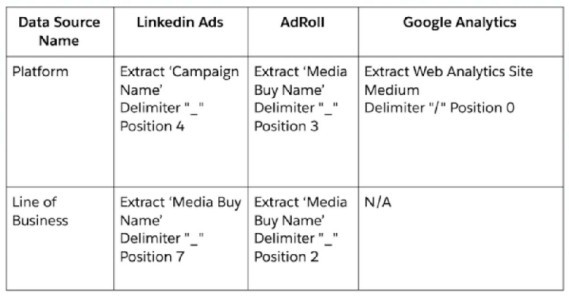
To apply the above logic, the engineer used only the Harmonization Center, without any mapping manipulations. What is the minimum amount of Patterns creating both ‘Platform’ and ‘Line of Business’?" |
| A. 2 | | B. 3 | | C. 5 | | D. 4 |
B. 3
Explanation: To create both 'Platform' and 'Line of Business' fields using Patterns in the Harmonization Center without mapping manipulations, the engineer would need to create separate patterns for each data source mentioned. According to the provided images:
One pattern for LinkedIn Ads, to extract the 'Campaign Name' at position 4 for the Platform and 'Media Buy Name' at position 7 for Line of Business.
One pattern for AdRoll, to extract 'Media Buy Name' at position 3 for Platform and at position 2 for Line of Business.
One pattern for Google Analytics, which seems not required for the Platform but could apply if the Line of Business extraction is necessary, although it states N/A.
Hence, a minimum of 3 patterns would be necessary to create the fields required.
Get 63 Marketing Cloud Intelligence Accredited Professional questions Access in less then $0.12 per day.
Salesforce Bundle 1:
1 Month PDF Access For All Salesforce Exams with Updates
$200
$800
Buy Bundle 1
Salesforce Bundle 2:
3 Months PDF Access For All Salesforce Exams with Updates
$300
$1200
Buy Bundle 2
Salesforce Bundle 3:
6 Months PDF Access For All Salesforce Exams with Updates
$450
$1800
Buy Bundle 3
Salesforce Bundle 4:
12 Months PDF Access For All Salesforce Exams with Updates
$600
$2400
Buy Bundle 4
Disclaimer: Fair Usage Policy - Daily 5 Downloads
Marketing Cloud Intelligence Accredited Professional Test Dumps
Exam Code: Marketing-Cloud-Intelligence
Exam Name: Marketing Cloud Intelligence Accredited Professional
- 90 Days Free Updates
- Salesforce Experts Verified Answers
- Printable PDF File Format
- Marketing-Cloud-Intelligence Exam Passing Assurance
Get 100% Real Marketing-Cloud-Intelligence Exam Dumps With Verified Answers As Seen in the Real Exam. Marketing Cloud Intelligence Accredited Professional Exam Questions are Updated Frequently and Reviewed by Industry TOP Experts for Passing Accredited Professional Certification Exam Quickly and Hassle Free.
Salesforce Marketing-Cloud-Intelligence Test Dumps
Struggling with Marketing Cloud Intelligence Accredited Professional preparation? Get the edge you need! Our carefully created Marketing-Cloud-Intelligence test dumps give you the confidence to pass the exam. We offer:
1. Up-to-date Accredited Professional Certification practice questions: Stay current with the latest exam content.
2. PDF and test engine formats: Choose the study tools that work best for you.
3. Realistic Salesforce Marketing-Cloud-Intelligence practice exam: Simulate the real exam experience and boost your readiness.
Pass your Accredited Professional Certification exam with ease. Try our study materials today!
Prepare your Accredited Professional Certification exam with confidence!We provide top-quality Marketing-Cloud-Intelligence exam dumps materials that are:
1. Accurate and up-to-date: Reflect the latest Salesforce exam changes and ensure you are studying the right content.
2. Comprehensive Cover all exam topics so you do not need to rely on multiple sources.
3. Convenient formats: Choose between PDF files and online Marketing Cloud Intelligence Accredited Professional practice questions for easy studying on any device.
Do not waste time on unreliable Marketing-Cloud-Intelligence practice test. Choose our proven Accredited Professional Certification study materials and pass with flying colors. Try Dumps4free Marketing Cloud Intelligence Accredited Professional 2024 material today!
-
Assurance
Marketing Cloud Intelligence Accredited Professional practice exam has been updated to reflect the most recent questions from the Salesforce Marketing-Cloud-Intelligence Exam.
-
Demo
Try before you buy! Get a free demo of our Accredited Professional Certification exam dumps and see the quality for yourself. Need help? Chat with our support team.
-
Validity
Our Salesforce Marketing-Cloud-Intelligence PDF contains expert-verified questions and answers, ensuring you're studying the most accurate and relevant material.
-
Success
Achieve Marketing-Cloud-Intelligence success! Our Marketing Cloud Intelligence Accredited Professional exam questions give you the preparation edge.
If you have any question then contact our customer support at live chat or email us at support@dumps4free.com.
|

